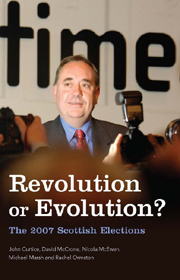Book contents
- Frontmatter
- Contents
- List of Tables
- Preface
- CHAPTER 1 A Watershed Election?
- CHAPTER 2 A Distinctive Scottish Voice? Identities, Values and Attitudes
- CHAPTER 3 What has Devolution Achieved? The Public's View
- CHAPTER 4 Governing Scotland: The People's Preferences?
- CHAPTER 5 Lost Labour Votes? Records, Personalities and Issues
- CHAPTER 6 How the SNP Won
- CHAPTER 7 Do Voters Care about Parties Any More?
- CHAPTER 8 A Personal Vote? How Voters Used the STV Ballot
- CHAPTER 9 Conclusion
- Technical Appendix
- Index
Technical Appendix
Published online by Cambridge University Press: 12 September 2012
- Frontmatter
- Contents
- List of Tables
- Preface
- CHAPTER 1 A Watershed Election?
- CHAPTER 2 A Distinctive Scottish Voice? Identities, Values and Attitudes
- CHAPTER 3 What has Devolution Achieved? The Public's View
- CHAPTER 4 Governing Scotland: The People's Preferences?
- CHAPTER 5 Lost Labour Votes? Records, Personalities and Issues
- CHAPTER 6 How the SNP Won
- CHAPTER 7 Do Voters Care about Parties Any More?
- CHAPTER 8 A Personal Vote? How Voters Used the STV Ballot
- CHAPTER 9 Conclusion
- Technical Appendix
- Index
Summary
DETAILS OF THE SURVEYS
The data presented in this book on the attitudes and behaviour of the resident population in Scotland at the time of the 2007 Scottish Parliament election are drawn from the 2007 Scottish Social Attitudes Survey. The survey was conducted by the Scottish Centre for Social Research (part of the National Centre for Social Research). This was the ninth year of the study, which started in 1999 with the Scottish Parliamentary Election Survey/1999 Scottish Social Attitudes survey (Paterson et al., 2001). The series is parallel to the long-established British Social Attitudes survey (Park et al., 2009).
THE 2007 SCOTTISH SOCIAL ATTITUDES SURVEY
The questionnaire for the 2007 survey consisted of a number of separately funded modules of questions. Most of the data used in this book come from a module on the parliamentary and local elections funded jointly by the Leverhulme Trust and the Economic and Social Research Council (ESRC). The Leverhulme Trust provided support for questions on the parliamentary election and on attitudes towards devolution. The ESRC (grant number RES-062-23-0513 and contract number T0063.GH.P&S), provided support for questions on the local elections and for a number of additional questions on constitutional preference, the powers of the parliament and the instrumental impact of devolution.
- Type
- Chapter
- Information
- Revolution or Evolution?The 2007 Scottish Elections, pp. 193 - 208Publisher: Edinburgh University PressPrint publication year: 2009



